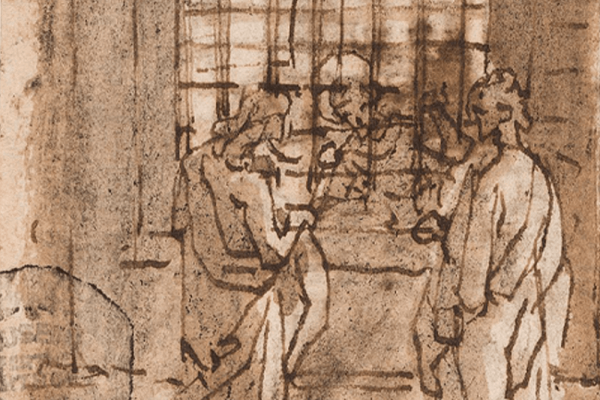The gospel message of liberation and reconciliation should push us toward the abolition of prisons and policing. Here are 10 Bible passages that help us wrestle with questions of mass incarceration, criminalization, and violence:
1. Luke 4:17–21
“[God] has sent me to proclaim release to the captives.”
Jesus’ “mission statement” when he begins his public ministry in Galilee includes a promise of liberation and release for those who are incarcerated. While the New Testament context of “captivity” wasn’t entirely the same as modern imprisonment, Jesus’ promise aligns liberation of prisoners with healing and good news for the poor and oppressed. Taking Jesus’ words in this text seriously forces us to ask: If God’s reign is characterized by freedom for prisoners, why are we supporting incarceration now?
2. Genesis 39:20-41:13
“But the Lord was with Joseph, and showed him steadfast love.”
The story of Joseph contains a promise of God’s fidelity throughout Joseph’s incarceration. God never leaves Joseph, and eventually vindicates him. Meanwhile, the stories of the two men imprisoned with Joseph — Pharaoh’s baker and cupbearer — highlight the arbitrary nature of incarceration, as one is freed and the other executed. As civil rights lawyer Bryan Stevenson says, our current system “treats you better if you’re rich and guilty than poor and innocent.” This is the inevitable result of a system that exists to serve the interests of the powerful.
3. Jeremiah 37:11–38:28
“What wrong have I done to you or your servants or this people, that you have put me in prison?”
The prophet Jeremiah is an early political prisoner. Before the fall of Jerusalem to the Babylonians, he is imprisoned because he tells King Zedekiah that God wants him to surrender to the Babylonians so Jerusalem will be spared. Jeremiah’s imprisonment reminds us that incarceration is fundamentally a tool of power. In our times, too, people who oppose the powerful in ways that are declared illegal — from whistleblower Chelsea Manning to water protectors at Standing Rock to Black Lives Matter protesters — face prison.
4. Daniel 3:1–30, Daniel 6:1–28
“... we have no need to present a defense to you in this matter.”
Daniel and his three friends — Azariah, Hananiah, and Mishael (the Jewish names for Shadrach, Mishach, and Abednego) — present examples of civil disobedience and another reminder that legality is not the measure of morality. In these stories, the Jewish exiles in Babylon refuse to obey laws designed to interfere with their religious practice and are punished by the state for it: Daniel is thrown into the lions’ den, and Azariah, Hananiah, and Mishael are cast into a fiery furnace. Their words to King Nebuchadnezzar — “we have no need to present a defense to you in this matter” (Daniel 3:16) — are a sign of their fidelity to God to deliver them, but also a challenge to the very legitimacy of punishment from an unjust state. When our systems of prisons and policing lead to unjust and racially disparate outcomes for marginalized people and communities, we can also say in response: “[W]e have no need to present a defense to you in this matter.” Our current system of mass-incarceration-as-racial-control is not the arbiter of justice.
5. Matthew 11:2-6; Mark 1:14
“After John was arrested, Jesus came to Galilee, proclaiming the good news of God.”
Jesus’ public ministry begins “after John [the Baptist] was put in prison” (Mark 1:14). Jesus preaches the coming kingdom of God under the shadow of that arrest. And when John, from prison, asks Jesus for a sign of whether he is the Messiah, Jesus’ response points to practices of solidarity and liberation that he is already enacting in the world (Matthew 11:4-6).
We, like John, see signs of hope and solidarity already being enacted among those who are criminalized and incarcerated — such as organizing by groups like the Incarcerated Workers Organizing Committee and grassroots prisoner support organizations led by incarcerated people and their loved ones like the California Coalition for Women Prisoners. This is a potent reminder that abolition begins with smaller acts of liberative hope.
6. Luke 23: 32–43
“... they crucified Jesus there with the criminals, one on his right and one on his left.”
Swiss theologian Karl Barth writes that the criminals crucified along with Jesus formed “the first certain Christian community.” As U.S. theologian and abolitionist Rev. Nikia Smith Robert writes, Jesus’ proximity to criminals and his position of criminality “make the cross and resurrection a site of retribution and resistance that points to the possibilities of transformation” of our system of mass incarceration. In other words, Jesus’ crucifixion as a criminal, among criminals, sets God ultimately on the side of those who are criminalized.
7. Acts 5:17-32, Acts 12:1-18
“But during the night an angel of the Lord opened the prison doors …”
Peter is miraculously released from prison twice in the book of Acts. In considering this story as Christians, we must be careful and take its description of the religious authorities with some reservation, remembering that it was composed in the context of Jewish-Gentile schisms in the first century. The New Testament’s villainization of Jewish leaders has had violent consequences throughout Christian history. The point here is not to condemn the high priest or the Sadducees, or to draw an exact parallel between the prison Peter was in and our modern prison-industrial complex — but instead to recognize God's liberating action within the story. The liberating work of God makes Peter’s story resonate with contemporary abolitionist efforts.
8. Acts 16:16-40
“Suddenly there was an earthquake, so violent that the foundations of the prison were shaken; and immediately all the doors were opened and everyone’s chains were unfastened.”
Paul and Silas are also imprisoned while preaching — by the Romans, in their case, and after being accused by a slaveholder whose wealth they had threatened. Their incarceration is clearly the result of challenging an established order of power. While they are in prison, God again miraculously opens the doors and breaks the chains in the prison.
Paul and Silas don’t escape but instead stay in order to protect the life of the jailer, and then convert him. This story, while it again shows God’s liberating power in the face of incarceration, can complicate our search for an abolitionist narrative in the Bible. Yet perhaps it demonstrates the varieties of forms solidarity and resistance can take within carceral settings. The power of God is present in the singing of hymns in the prison and among those who are incarcerated; prison is where the jailer finds God. Abolition — unlike criminal justice reform — must be driven by the needs and priorities of incarcerated people and those who love them, because that is where the liberating power of God is present.
9. Matthew 18:1–20
“So it is not the will of your Father in heaven that one of these little ones should be lost.”
What do we do about harm and violence without prisons? Abolitionists turn to restorative justice and transformative justice, methods of dealing with interpersonal harm by meeting the needs of those harmed within a community. The New Testament offers support for this work in Matthew 18, as activist theologian Ched Myers and restorative justice practitioner Elaine Enns write. The admonition to protect “little ones” (Matthew 18:6), they explain, requires we prioritize the needs of those who have been harmed or who are at risk of harm, especially when they have less power in a situation (a key insight of transformative justice); the parable of the lost sheep (Matthew 18:11–14) reminds us that God doesn’t want anyone thrown away or excluded, regardless of what they have done (a foundational value of restorative justice).
A word of warning: Treating Matthew 18:15–20 as a “process” to follow is dangerous, especially if it ignores power dynamics in situations of harm or abuse! Supporting those who have been harmed must always take priority in our practices of restorative and transformative justice. Nonetheless, this chapter as a whole supports values of safety and restoration, and teaches us that God is with us in the process of what abolitionists Mariame Kaba and Shira Hassan call “fumbling towards repair.”
10. Matthew 25:31–46
“... I was in prison and you visited me.”
Jesus’ description of the final judgment offers the last word on incarceration, and although this appears in the gospel of Matthew, it’s a fitting ending because it’s a picture of the end times. Jesus identifies himself with those who are criminalized and incarcerated, and even promises that our solidarity with them is what determines our eternal destiny.
As biblical scholar Lee Griffith writes, when we act in solidarity with those in prison, “It is not that we find God there; it is that God finds us there.” We can honor God’s identification with those who are criminalized and imprisoned when we commit ourselves to abolition.
Got something to say about what you're reading? We value your feedback!







